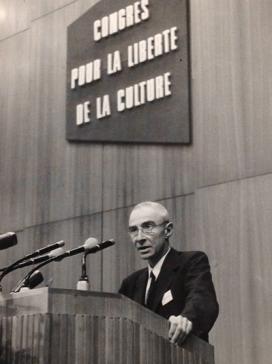Thinking about science and its social, political, and cultural implications became a matter of primary concern at the very center of political and cultural landscape of the Cold War. During the Cold War, the political, military, and ideological pressures and anxieties played central role in reconceptualizing science as a social, political, and moral activity. Studies of social, political, ethical, and philosophical aspects of scientific development emerged as a desirable—and politically relevant—area of research, debate, and expertise.
In her book, Science Studies During the Cold War and Beyond: Paradigms Defected (Palgrave Studies in the History of Science and Technology, 2016), Elena Aronova examined the specific ways in which ideas about science have become a sphere of Cold War competition. She follows the debates, in the US and the USSR, about two ways of organizing science and harvesting its fruits, to tell a story about the Cold War. The Cold War was, among other things, about ideas, about thinking. Historians studying the end of the Cold War argued that international political change that led to the collapse of communism was driven by ideas developed in capitalist “West,” and Mikhail Gorbachev’s “new thinking” emerged in socialist “East,” which played even more decisive role than the US–Soviet power relationships. But the ideas that shaped policies of both the United States and the Soviet Union did not emerge suddenly in the minds of political elites. They had been gestating slowly in the minds of political and academic thinkers on different sides of the "curtain," were crafted in different national contexts, and had moved across the “curtain.”
The subjects of the intellectuals' debates about science and its role in society varied, but what mattered in the end was figuring out the ways of how to win the Cold War. One of the most popular answers was deceptively simple: in the Atomic era the competition between the redefined “East” and “West” was based not on military victory but rather on the superior ability to develop, manage and apply the advances of science and technology. Elena Aronova's project showed that the Cold War fault-line fell not only between socialist “East” and capitalist “West” but also, and equally importantly, within “East” and “West” alike. She traced the fragmented parts of the same conversation, which the intellectuals on different sides were engaged with. In the West it was a conversation about liberal values and a Good Society. In the Soviet Union, as the story of “Soviet science studies” demonstrates, the intellectuals responded to the same anxieties and concerns of the Cold War as their Western counterparts, while adapting and transforming them in highly specific and often peculiar ways. Aronova argued that these discussions animated the processes that led to Mikhail Gorbachev’s “new thinking” and the collapse of the Soviet Union. "Thinking science" played major role in these processes.

